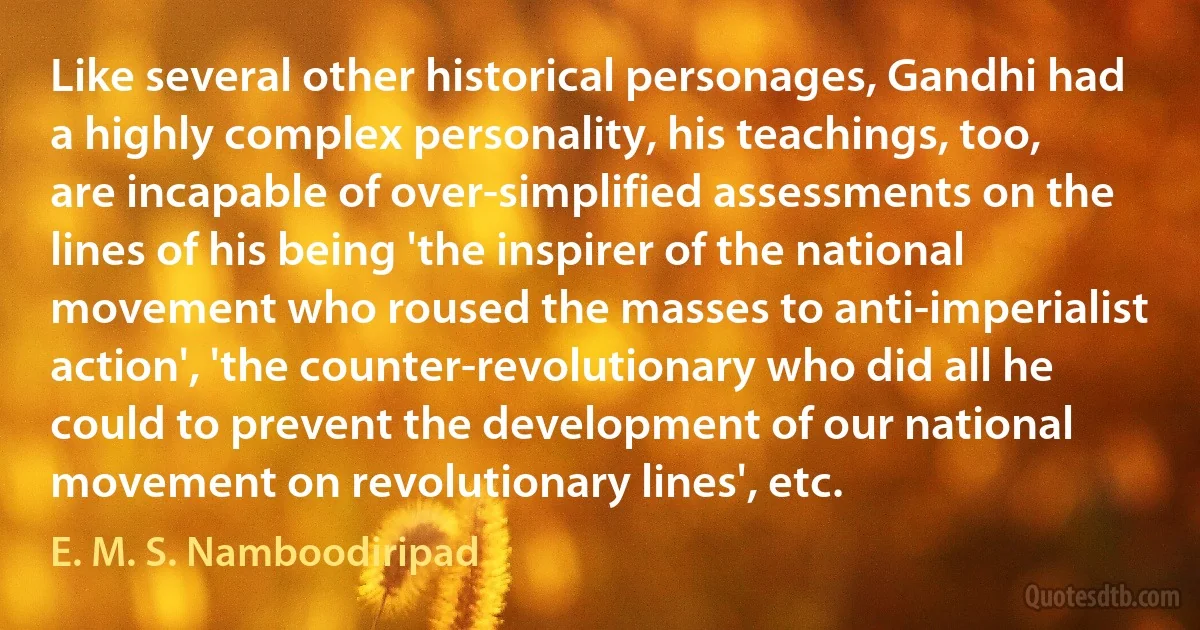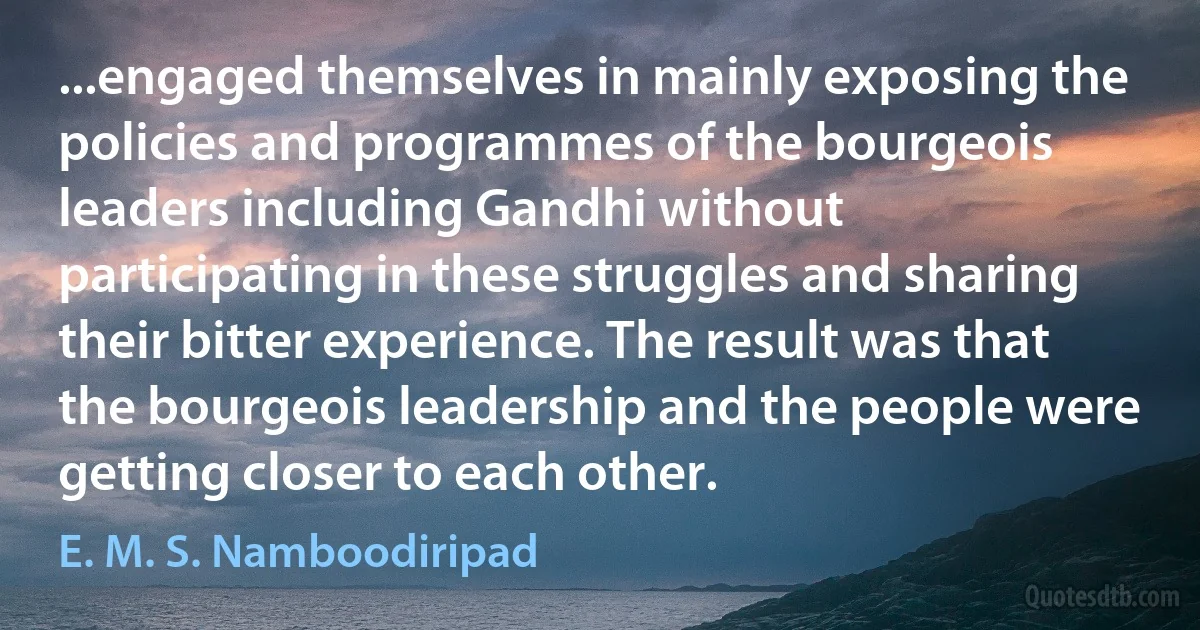E. M. S. Namboodiripad quotes
This new theory of Dravidian superiority is as unscientific as the theory of Aryan superiority. For, it goes against all the accepted conclusions of historical research, which have conclusively proved the indivisible links between social and family institutions on the one hand and the stage of civilization on the other.

E. M. S. Namboodiripad
As opposed to this two-stage transformation-slave to feudal and feudal to capitalist-in Europe, India remained tied to the same old order under which the overwhelming majority of the people belonged to the oppressed and backward castes. This is the essence of what Marx called India's ‘unchanging' society where the village was not touched by the wars and upheavals at the higher levels, the British conquest being the first revolution.

E. M. S. Namboodiripad
But when people like Mundassery tried to correct us, they viewed form and content as two separate categories and argued for perfection in both. That was their theory. In fact the form and content are not so separate of conflicting categories. For progressive content there must be progressive form. The progressive form is the same as perfect form. Those like Mundassery did not realize the relation between the two.

E. M. S. Namboodiripad
Why and how did our country fall from its brilliant antiquity to the degradation of pre-British days? The answer is that defeat of the oppressed castes at the hands of the Brahminic overlordship, of materialism by idealism, constituted the beginning of the fall of India's civilization and culture which in the end led to the loss of national independence.

E. M. S. Namboodiripad
...the Buddha whose near-materialist philosophy gripped the mass of suppressed humanity...those belonging to the materialist school had to fight an unequal fight and were therefore defeated...the defeat of the materialists in this unequal battle was the beginning of a millennium-long age of intellectual and socio-political backwardness which culminated in the establishment of British rule in our land.

E. M. S. Namboodiripad
It is the fact of life that a truth emerges out of a conflict between two wrongs. The development of society is through contradictions. Thus the Roopa Bhadrata argument which arose out of our conflict was wrong, in another sense it was correct too. Evaluating the worth of literature we should never confine ourselves to content alone. Mundassery was correct in insisting that form too is to be evaluated. In his own words it is not enough to have perfect content, it must also have perfect form. That is Roopa Bhadrata. Is that not correct? Yes, it is. We accept that we were wrong on that count. Those of us who founded the Jeevat Sahitya Sanghom were political workers. We looked at literature too through political eyes. So we did not pay sufficient attention to the artistic structure of literature. That was our mistake.

E. M. S. Namboodiripad
Elements of Gandhism were by and large inherent in my life style and mode of thinking even after I adopted Marxism. While expressing my ideological difference with Gandhism, I became a political activist who upheld the high values of Gandhism and tried to translate them in my personal lifestyle.

E. M. S. Namboodiripad
We had then and still have to fight a two-front battle. Ranged against us on the one hand are those who denounce us for our alleged ‘departure from the principles of nationalism and socialism', since we are championing ‘sectarian' causes like those of oppressed castes and religious minorities. On the other hand are those who, in the name of defending the oppressed caste masses, in fact, isolate them from the mainstream of the united struggle of the working people irrespective of caste, communities and so on.

E. M. S. Namboodiripad
It is far from the truth to say that the rebellion was a communal riot, that the objective of the rebels was the destruction of Hindu religion and that the six months of rebellion were six months of anti-Hindu atrocities... All this, however, does not mean that religious fanaticism was totally absent in the rebellion. The numbers of forced conversions which did take place cannot by any stretch of imagination be explained by any other motive than religious fanaticism... One can and should, however, state explicitly that the main force behind the rebellion was not fanaticism which was simply a by-product...

E. M. S. Namboodiripad
EMS was uniquely positioned to analyze the various phases of the national movement and the role of Gandhi. He began his political life as an ardent Gandhian. Through out his life, while d adhering to the Marxist world outlook, he practiced many of the Gandhian principles of simplicity and personal austerity that are cherished by Indians.

E. M. S. Namboodiripad


